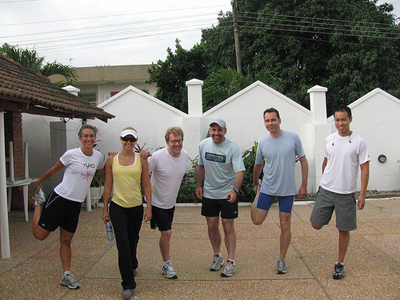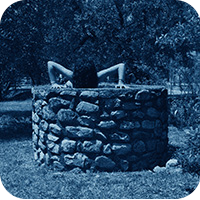But most of all, I missed YOU
I’ve been home from Africa just under a month. Thought I’d compile a list of things I miss and things I don’t.
Things I Miss:
- The Ghanaian handshake – Slap your hands together loudly (not a high five, just an aggressive bringing together of the hands for a normal handshake), hold until its a little awkward, then pull apart with a snap. I never quite got it and always felt horribly unhip trying to pull it off. But it was cool to be greeted like that.
- Laundered shoelaces – There was no laundromat nearby so we had some sketchy service that would come into our rooms and look for anything dirty. Before I figured this racket out they actually unlaced my running shoes (reddened by clay from dirt roads) and washed them separately. Anything for the upcharge, I suppose, though it was nice to have such gleaming white laces.
- Having taxis hail me – You never have to wave a cab down in Ghana, especially if you’re white. No matter where you are or how little you look like you need a ride, dozens of taxis will beep-beep beep-beep until you demonstrably tell them to go away.
- Saying “Ougadougou choo choo” – Ougadougou (wah·gah·DOO·goo) is the capital of Burkina Faso, the country to Ghana’s north. It is also the world capital with the most vowels in it. (Take that, Bosnia!) The nickname of the train service in and out of the capital is perhaps the most fun thing to say since I learned “trabajaba” in high school Spanish.
- Rear window car signage and business names – For reasons I still don’t completely understand Ghanaians are obsessed with naming their cars and shops with unintentionally humorous phrases from the bible. Or from something that sounds scriptural. Or not. “Be Holy Electrical Works”, “Dr. Jesus”, “I came naked”, “It wasn’t me”.
- Our prison economy – There were 10 of us at the guest house and we had only what we shlepped from home. Inevitably people forgot things and/or had items to swap. Though the Ghanaian markets offered lots of goods, there were certain things (meds, amenities, candy) that we had to barter amongst ourselves. It became a prison economy where mosquito wipes and vodka, rather than smokes, served as coins-of-the-realm.
- Dial-a-proverb – Emerson said “language is fossil poetry” which is a pretty accurate description of how laden the Twi language is with poeticisms and figures of speech. In fact, formal conversation consists of little but such turns of phrase. My interest in this characteristic of Twi became a game with my friend Yaw who would take any situation I gave him, call his pal who’s a master of Ghanaian proverbs, and come back with an appropriate phrase for the occasion.
Things I Do Not Miss:
- Restaurant service – No matter where we went, city or village, Italian, Chinese, Lebanese or Ghanaian, all meals took at least two hours. Even when we thought we were being sly by calling in our orders, the service was atrocious. We think this was because of limited staff and the fact that everything was made basically from scratch as soon as it was ordered. There were never enough menus to cover the table and food was never brought to us even near the same time. Often people were served thirty minutes after others. The food, however, was almost always exceptional.
- The Ghanaian noise for getting one’s attention – I understand that this is a perfect example of clashing cultural habits, but the staccato hiss that Ghanaian’s use to hail someone is just poison to Western ears. It sounds like a curse or worse, though admittedly it does get your attention.
- Lack of currency – Last year Ghana re-denominated its currency such that 10,000 old cedis would be equal to one new cedi. There were many reasons for this, but most signage has not caught up. That’s a surmountable, calculable inconvenience, but the reality is that no one ever has change. Hacking off four zeros means no one has the sub-cedi currency known as the pesewa. Merchants can’t break even small bills. I can’t tell you how many times I simply walked away either without the good I wanted or having given the merchant a sizable “tip”.
- Instant coffee – ’nuff said.
- Compact fluorescent bulbs – Don’t get me wrong. I’m all in favor of CFL’s, but Ghana has adopted them in a huge way. I don’t think I saw an incandescent the whole time I was there — which itself is fine, but CFL’s have indiscriminately and nakedly replaced every bulb everywhere. There’s nothing less comforting that a bright, uncovered fluorescent bulb. To make the switch, in my opinion, requires not just environmental consciousness but also some stylistic consideration.
- Racist South Africans – I met three white South Africans while I was in Ghana. The first was a racist drunk at a local Internet cafe who obsessively gambled online while smoking a hookah pipe. One night he was too drunk to realize that a shisha coal had fallen onto his laptop power supply. BOOM! It was like someone detonated a small firework. But he kept gambling on battery power. The second was a chatty guy at a hotel I was staying at in Accra. He would not take any hint that we did not want to talk to him at breakfast and insisted on letting us know his impressions of Ghanaians, this being his first visit. Let’s just say he used the word “savage” frequently. The third was a very pleasant, younger guy on his own on a business trip who made it clear that not all white South Africans harbor such deep-seated racism. I’m glad I met him.
- Dirt roads – My ass and nerves will never be the same. See the first part of this post.
- Diet Coke false advertising – Called Coke Light in Ghana, Diet Coke is obviously the focus of a massive marketing campaign. Billboards and signage are everywhere. And yet, no one ever has it in stock. It is a mythical elixir, something promoted but never distributed. My colleagues made fun of me for continuing to ask for it after a dozen failures, but by then it was a matter of principle.
- Under-table space management – We often ate out in relatively large groups. This required restaurants to push tables together. Inevitably seats would be placed right at the junction of two tables where no two legs could ever go. We saw this everywhere. It was almost as if the ability to arrange a table with chairs around it were more important than actually seating people there.
And yet, those cons are not nearly enough to make me not want to get back as soon as possible.















